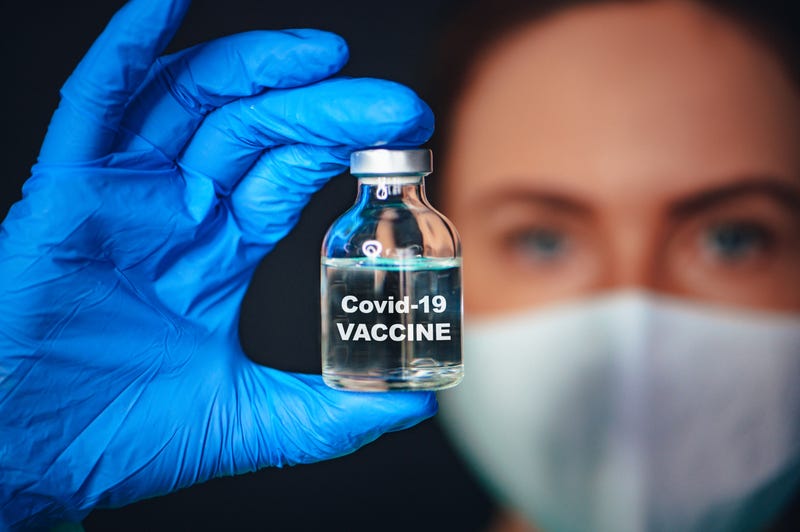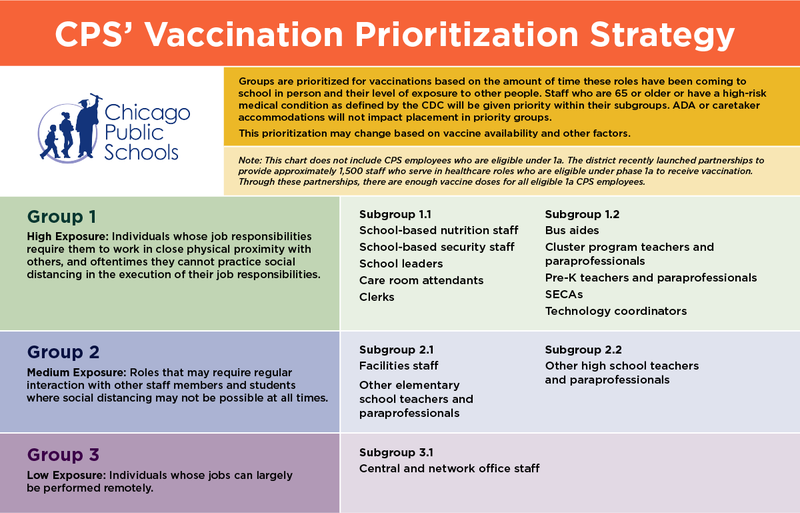
CHICAGO (WBBM NEWSRADIO) -- The Chicago Public Schools system and the Chicago Department of Public Health announced Friday a plan to vaccinate thousands of eligible staff and educators under Phase 1B of the state’s vaccination plan. But what’s missing is vaccine.
Per the State of Illinois and CDPH’s vaccination plan, vaccination eligibility is expanding to those 65 and older and frontline essential workers, including teachers and school staff, beginning Monday, Jan. 25 in Phase 1B.
The problem is vaccine availability is ultimately dependent upon the number of vaccines the city receives. CPS expects to begin receiving vaccines directly in mid-February, at which point it will begin a multi-month effort to offer vaccinations to eligible staff.
This week, CPS joined with CDPH and local healthcare providers to give approximately 1,500 CPS healthcare workers access to the vaccine. Beginning next month, CPS will begin establishing vaccination centers in four CPS buildings around the city as part of the Phase 1B vaccination plan. CPS CEO Dr. Janice Jackson said to make sure the district is ready, CPS is establishing a Vaccinator Corps of CPS nurses who will be trained to administer the vaccine.
Staff eligible to receive the vaccine can get it either through a healthcare provider or through a CPS vaccination center. The centers will open in mid-February, when the vaccine doses become available to the district. They will have hours of operation that are accommodating to the work schedules of employees to minimize learning and work disruptions.
"There is nothing we want more than to get the shots in the arms of our dedicated staff," Jackson said. "If we could vaccinate everyone today, we would do it. But with supplies being limited, our plan to distribute vaccines will need to take into account several factors. And as with everything that we do in CPS, it will be rooted in equity."
Jackson said the plan will prioritize employees over 65 and those at high risk. Employees who have been reporting to school buildings since the start of the pandemic will also receive priority, including nutrition staff, security staff, and administrators.

"I want to be clear. The ultimate goal is to vaccinate all of our staff members as quickly as possible," Jackson said.
Chicago Department of Public Health Commissioner Dr. Allison Arwady said on Monday, Jan 25 all educators, just as all people over 65 and all other frontline essential workers, become eligible for vaccine.
"So on Monday, for example, a teacher or other school staff member, has an appointment with their physician, has an appointment at their pharmacy, they are eligible to receive vaccine," she said. "But as I have been noting all week, the amount of vaccine Chicago is receiving right now is minuscule compared to the number of people who need to be vaccinated in Phase 1B."
She said the city is receiving about 34,000 first doses of vaccine per week.
“These vaccines are safe and effective, and while we’re asking for patience as we work through the roll-out, we encourage everyone to get vaccinated when it is their turn,” Dr. Arwady said. “Studies, including our own, have consistently supported that in-person learning is safe and not a source of significant spread of the virus. In fact, we are more concerned about spread in social situations outside school, where there are fewer controls and precautions in place.”
If the federal government is able to provide vaccines on its intended schedule, the district is working toward vaccination of all of its employees in the coming months. While vaccination is a critical step in working toward resuming normal operations, public health officials do not recommend delaying in-person instruction until employees are vaccinated. This assessment is based on extensive research which shows that schools can operate safely when necessary mitigations such as mandatory mask-wearing, social distancing, hybrid scheduling and other measures implemented by the district are utilized.
Teachers following the livestream on Facebook and writing comments were fairly brutal in their criticism.
Of more immediate concern is what happens on Monday, when about 10,000 teachers are due back in classrooms.
If they fail to show, Jackson said, that will be considered an illegal strike.


